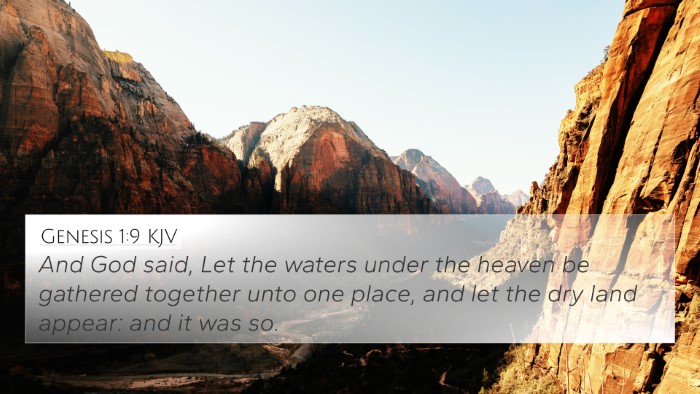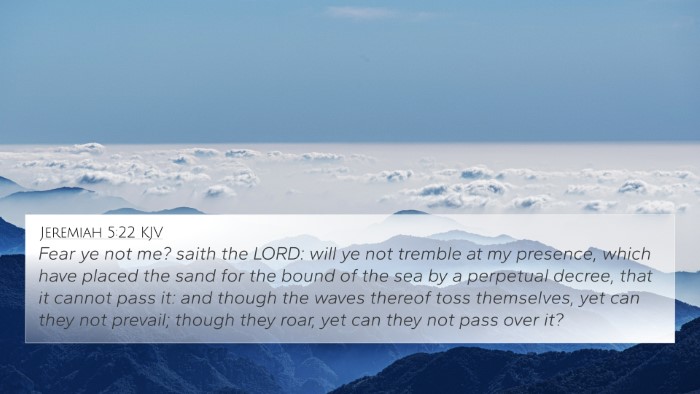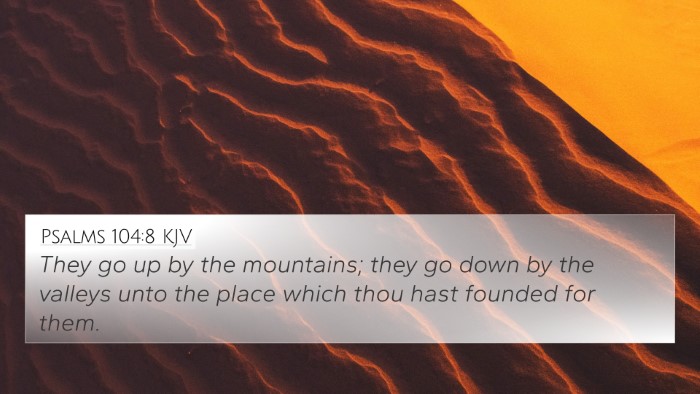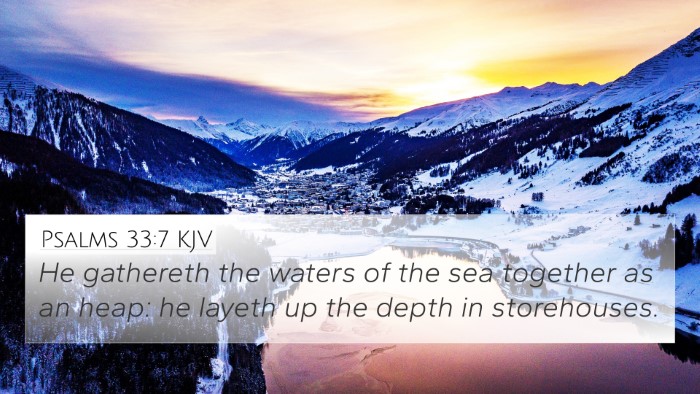Understanding Job 38:8
Job 38:8: "Or who shut up the sea with doors, when it brake forth, as if it had issued out of the womb?"
This verse is part of God's response to Job, where He challenges Job’s understanding of creation and the natural world.
Key Themes
- The Sovereignty of God: God’s authority over the natural world is emphasized, showcasing His role as the Creator.
- Human Limitations: Job's struggle to comprehend God's purpose illustrates humanity's limited understanding in contrast to divine wisdom.
- Creation Imagery: The metaphor of the sea issuing from a womb signifies the life-giving and uncontrollable forces of nature.
Commentary Insights
This verse is critically analyzed by various public domain commentaries:
Matthew Henry's Commentary
Matthew Henry points out that God’s rhetorical questions serve to remind Job of his limitations. He highlights that the sea is powerful and chaotic, yet it is controlled by God's decree. This demonstrates God's ultimate power over creation, suggesting that Job should trust in God’s governance amidst his suffering.
Albert Barnes' Notes on the Bible
Albert Barnes elaborates that the 'doors' refer to the boundaries that God has set for the sea, emphasizing His authority. In an artistic manner, God describes the sea as breaking forth, akin to a child being born, indicating that creation has its origins and limitations established by Him.
Adam Clarke's Commentary
Adam Clarke connects this imagery of the sea to the realities of God's creative power and control. He discusses how the seas, while vast and seemingly unstoppable, have limitations imposed by God, thereby reflecting His perfect order and purpose in the natural world.
Cross-References
- Proverbs 8:29: "When He gave to the sea His decree, that the waters should not pass His commandment."
- Psalm 104:9: "Thou hast set a bound that they may not pass over; that they turn not again to cover the earth."
- Jeremiah 5:22: "Fear ye not me? saith the Lord: will ye not tremble at my presence, which have placed the sand for the bound of the sea?"
- Isaiah 51:10: "Art thou not it which hath dried the sea, the waters of the great deep; that hath made the depths of the sea a way for the ransomed to pass over?"
- Revelation 21:1: "And I saw a new heaven and a new earth: for the first heaven and the first earth were passed away; and there was no more sea."
- Job 26:10: "He hath compassed the waters with bounds, until the day and night come to an end."
- Psalm 33:7: "He gathereth the waters of the sea together as a heap: He layeth up the depth in storehouses."
Connections to Other Bible Verses
This verse has profound connections with other passages that reflect on God's creation and control over nature, encouraging a deeper understanding of the interconnectedness of scripture:
- Psalm 89:9 - "Thou rulest the raging of the sea: when the waves thereof arise, thou stillest them."
- Isaiah 43:2 - "When thou passest through the waters, I will be with thee; and through the rivers, they shall not overflow thee."
- Luke 8:24 - "And they came to him, and awoke him, saying, Master, master, we perish. Then he arose, and rebuked the wind and the raging of the water: and they ceased, and there was a calm."
The Importance of Cross-Referencing
Utilizing cross-referencing tools such as a Bible concordance or Bible cross-reference guide can enhance your study by linking biblical texts that share common themes or context. This method allows for:
- Identifying connections between the Old and New Testament.
- Finding Bible verses related to specific themes.
- Engaging in a comprehensive analysis of scripture through comparative Bible verse analysis.
Conclusion
Job 38:8 invites believers to reflect on the majesty and authority of God in His creation. By understanding this verse within its broader context, along with its cross-references, one can gain a richer perspective on the divine nature of God as the ultimate ruler over all forces of nature. Engaging deeply with this scripture along with its connections enhances both theological comprehension and devotional application.








